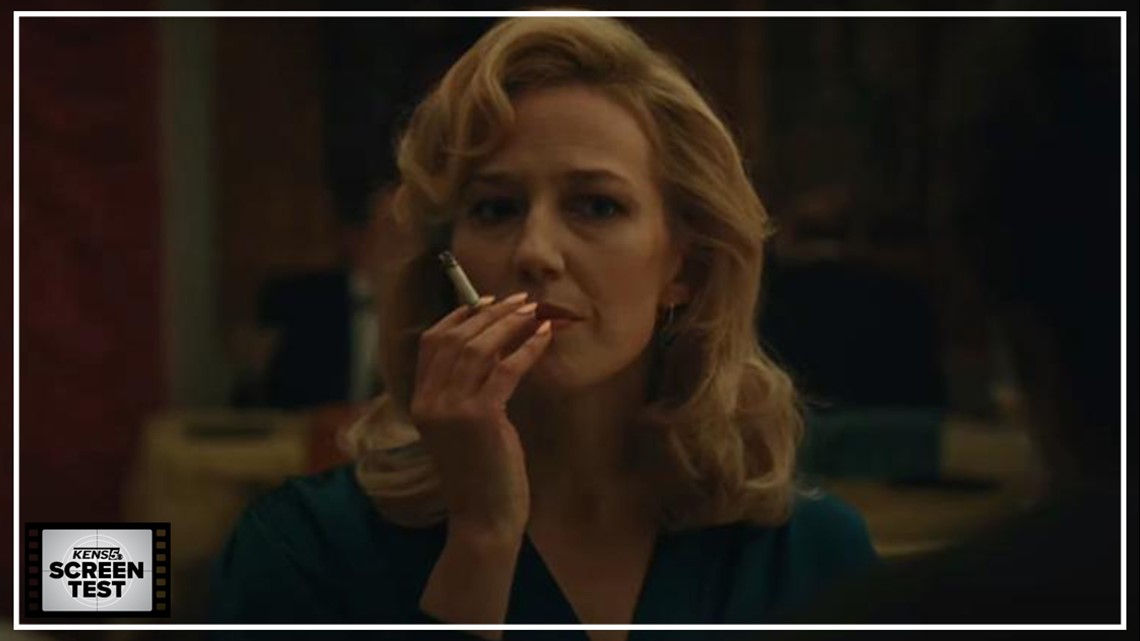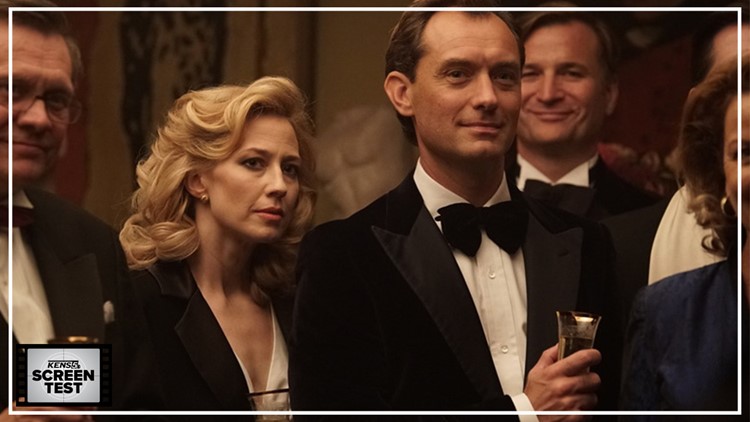There’s an element of theater in the early days of a relationship. We rehearse our lines when preparing to stroll by that person who’s lingered on our mind, and perhaps we pick out the precise spot where we’ll “accidentally” stumble into them. We practice our delivery in front of the mirror, perfect our appearance. We pay strict attention to timing, and stress over the lighting and design of a date; there’s a specific mood to set, after all. We obsess over the specifics, hoping to direct our way from mutual infatuation to something more meaningful.
There’s also a theatricality to Jude Law’s Rory as he guides his family through their new England estate early in Sean Durkin’s “The Nest,” making sure to tout the mansion’s foundations – “This hardwood was laid in the 1700s! It’s still perfectly preserved!” – and the fact that Led Zeppelin once spent a recording session within these cavernous walls. He's hitting the beats, making sure to reach for those emotions of blissful excitement…and he may be a touch desperate, too. Rehearsal in year 10 or 15 of a relationship means something very different than rehearsal on day 10 or 15.
The showmanship of domestic life is the subject of Durkin’s highly polished and hauntingly dire new film, one where the cracks have begun to form between wedded couple Rory and Allison (Carrie Coon) long before we’re introduced to them. Over about two hours, Durkin will show off his precise filmmaking hand as we ride the splintering along with them, with little room to navigate away from the looming cataclysm—but first, Rory’s got to deliver Allison her morning coffee. It’s clearly a routine, but he’s bringing some news as well: He’s making plans for them to move from their stateside home across the pond to London, where he says an “opportunity” awaits.
Who exactly is the opportunity for? Fair question, considering all seems to be well where they're currently at. He’s being a bit cryptic – Rory has very much rehearsed this interaction to a T, too – but Allison’s response isn’t. She flings up the duvet in exasperation; not only does her husband seem to have made up his mind, but apparently this isn’t the first time he’s pulled this stunt.
Rory’s decisions may as well be a series of stunts, we come to suspect—and the suspicion only gains strength once they begin to settle into their new home. A random passerby on the street would notice a family happily exploring their new abode, but to watch “The Nest” is to be embroiled in a tension that’s simmering, simmering, simmering away from the opening shot. The collaborators Durkin has assembled behind the screen are just as noteworthy as those in the frame (more on Law and Coon soon). There’s the swampy bluish-green greys of a David Fincher flick that belie interpersonal toxicity, while cinematographer Mátyás Erdély’s eye is a cautious observer; her pristinely composed shots offer the first suggestion that we should anticipate something, something potentially dreadful. Our ears are also put on high alert; the score by Richard Reed Perry is one of the year’s best in the way it teases with its abrasive flourishes.
All this is to say there’s a muscularity of mood to Durkin’s movie, and the director flexes it so enticingly that when Allison finds out her husband is behind on payments and it becomes increasingly obvious that fragile Rory prioritizes his reputation as a businessman over his family, we find ourselves whispering remarks of vindication under our breath. But we also find ourselves catching it; we sense the anvil swaying above these characters’ heads as they begin to slowly tear down the illusion of content familyhood that they’ve silently agreed to fortify all these years. Even the mostly aloof kids, Samantha (Oona Roche) and Ben (Charlie Shotwell), are aware of the distance between their parents. You can feel them measuring it from afar.
On the surface, we’ve seen this kind of movie before. Marital hell – especially when constructed using the aesthetics of horror – is a cinematic canvas that’s been revisited by many a director, and some of the best dramas of all time reside in the canon. The emotions “The Nest” stirs might be familiar, too; namely, that most human of anxieties that one day we’ll find that the years spent building up a successful marriage (or the illusion of one) have suddenly been for naught. The encroaching shadows and unmistakable iciness make “The Nest” more akin to “Who’s Afraid of Virginia Woolf?” than “Marriage Story,” but its nuanced insinuations of inevitability – of making the one-way voyage across the River Styx of family deterioration – means the most apt comparison may in fact be Andrew Haigh’s “45 Years.”
“Leave the worrying to your husband,” Allison’s mother tells her before they embark on their new journey. But Coon – one of our most reliable actresses, and so very good and demanding of our attention as Allison – makes sure we catch the fleeting hint of doubt behind her eyes. “The Nest,” among many things, is a movie about the weighing of marital expectation, and it’s in the lead performances that we observe the scales readjusting themselves as the runtime goes on.
Rory and Allison can pretend like they’re maintaining a façade of mutual respect, but we see the gears of a power struggle churning—quietly at first, then deafeningly. For the ever-capable Law, who’s been riding the HBO and blockbuster circuit over the last couple years, “The Nest” represents a chance at a delicately understated turn. He succeeds, by way of how much we distrust him. Rory is a squeamish, selfish, ostensibly cunning figure prone to bouts of immaturity, and all this is emboldened by our familiarity with the still-handsome actor. Rory insists that he’s in control, while the stunning Law hints otherwise. Meanwhile, there’s no use trying to break our gaze away from Coon, especially as Allison begins to rebel against the unwritten rules of wifely subservience. She’s a firecracker here.


As good as Coon and Law (and Durkin and Erdély and Perry) are at injecting us into the wobbly reality of this marriage, there’s the possibility “The Nest” does its job a bit too effectively. There are scenes that strain to reconcile the ultra-refined tangibles with a comparatively economical screenplay, and I found myself wondering: Where does “The Nest” have room to expand when conclusions feel so inevitable, even as we’re rocketing toward them on the riveting firepower of subliminal cruelty?
Durkin’s response arrives a bit late, but arrive it nonetheless does in the form of an utterly gripping relocation of fragmented motivations. The filmmaker, not one to want us stretching our legs in the absence of universality, stretches his themes to encompass the consequences of an American Dream that travels across oceans, with its lies in tow. It’s enough to have prevented me from fretting too long about an earlier, strangely overwrought metaphor on a sickened marriage, one involving Allison and her beloved steed.
The implication is made even more robust by Law’s evolving performance, one that dials into the self-pity as Rory takes a cab home – alone – while Allison dances the night away at a club, carefree and unshackled. The movie is smart enough, however, to make us wonder: How liberated is Allison, really, now that she’s dispensed with the theatrics for a spontaneity that may be more dangerous? The question sharpens itself in a final shot unfolding around uncertainty for the future, as the family gathers for breakfast amid metaphorical (and somewhat literal) ruins of a breakdown.
There’s trepidation over the ambiguity of what’s to come. There’s also, for the first time, honesty.
"The Nest" is rated R for language throughout, some sexuality, nudity and teen partying.
Starring: Jude Law, Carrie Coon, Anne Reid, Charlie Shotwell
Directed by Sean Durkin
2020
OTHER SCREEN TEST REVIEWS:
- ‘The Secrets We Keep’ Review: Noomi Rapace shines in shoddy morality play
- ‘The Devil All The Time’ Review: Tom Holland leads all-star cast in glum, aimless portrait of a tarnished America
- 'Buoyancy' Review: The cruelties of a corrupt fishing industry are spotlighted in one-dimensional story
- ‘The Social Dilemma’ Review: Another compelling, urgent argument for questioning what shows up in our Facebook feeds
- ‘I’m Thinking of Ending Things’ Review: Charlie Kaufman resumes his search for meaning in haunting Netflix head trip
- ‘Tenet’ Review: Christopher Nolan’s time-bending exercise was made for an audience of one
- ‘Epicentro’ Review: A monumental and monumentally complex observation of Cuba at a crossroads
- ‘Centigrade’ Review: Wintry thriller feels as weary as its trapped victims
- ‘Tesla’ Review: Overlooked innovator gets the spotlight in alluringly unconventional biopic
- ‘Unhinged’ Review: Russell Crowe is on a rampage in brutal, thematically stagnant thriller
- ‘Boys State’ Review: Political maneuvering knows no (age) limits in enthralling new documentary



